初中英语 新目标(Go for it)版 八年级下 Unit 2 I'll help to cl
最新人教新目标版八年级英语下册Unit2I’llhelptocleanupthecityparks测试题2

Unit 2 单元测试题Written test part (共95分)Ⅴ.单项选择(每小题1分,共15分)从A、B、C、D四个选项中选择可以填入空白处的最佳答案。
( ) 21. The heavy snow didn’t make a difference ________ the sports meeting.A. forB.toC. atD. on ( ) 22. Linda gets great ________ from helping others, so she’s always ready to give others a helping hand.A. discussionB. satisfactionC. preparationD. prediction( ) 23. Thanks to Mary, we came up with a ________ idea of getting us out of the difficulty.A. cleverB. prettyC. seriousD. famous( ) 24. My computer doesn’t work. Could you help ________ it, Dad?A. shareB. solveC. deleteD. repair( ) 25. Parents often tell their kids ________ too much junk food because it’s bad for their health.A. to eatB. eatingC. not to eatD. not eating( ) 26. Machines make ________ possible for people to do more work with less time.A. thisB. thatC.oneD. it( ) 27. Mrs. Miller used to ________ a bike to work, but now she is used to ________ to work.A. ride; walkB. riding; walkingC. riding; walkD. ride; walking( ) 28. My father stopped his car ________ a short break as he felt tired.A. to takeB. to takingC. to meanD. to meaning( ) 29. I don’t think I can finish the work in ________ a short time.A.soB. suchC.very D. too( ) 30. —Excuse me, do you know David?—Yes. He lives next door to me. I watched him ________.A. lie downB. lying downC. growing upD. grow up( ) 31. Linda worked hard and finally she ________ get an A in the exam.A. was able toB. had toC. is able toD. has to ( ) 32. You needn’t go to the guitar lesson t omorrow. The teacher ________.A. put off itB. put it offC. fixed up itD. fixed it up( ) 33. When Bob had the flu, his mother ________ him day and night.A. found outB. took upC. cared forD. took away( ) 34. —Excuse me, can you tell me the way to the library?—I’m new here. ________.A. You could ask that man in redB. You shouldn’t walk aloneC. You must stay with meD. You needn’t call your friend( ) 35. —It’s time to save our planet.—________. We are facing a lot of environmental problems.A. You’re welcomeB. You’re rightC. Lucky youD. It’s up to you Ⅵ.完形填空(每小题1分,共10分)先通读下面的短文,掌握其大意,然后从A、B、C、D四个选项中选择可以填入空白处的最佳答案。
初中英语新教材Goforit!Unit2说课稿
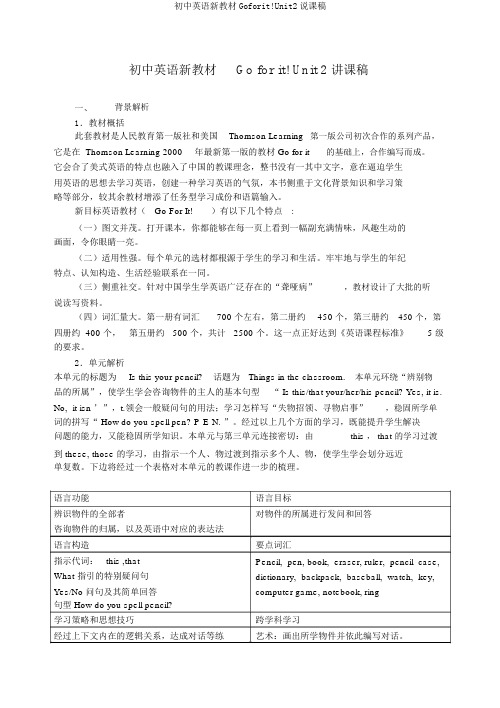
初中英语新教材Go for it! Unit 2 讲课稿一、背景解析1.教材概括此套教材是人民教育第一版社和美国Thomson Learning第一版公司初次合作的系列产品,它是在 Thomson Learning 2000年最新第一版的教材Go for it的基础上,合作编写而成。
它会合了美式英语的特点也融入了中国的教课理念,整书没有一其中文字,意在逼迫学生用英语的思想去学习英语,创建一种学习英语的气氛,本书侧重于文化背景知识和学习策略等部分,较其余教材增添了任务型学习成份和语篇输入。
新目标英语教材(Go For It!)有以下几个特点:(一)图文并茂。
打开课本,你都能够在每一页上看到一幅副充满情味,风趣生动的画面,令你眼睛一亮。
(二)适用性强。
每个单元的选材都根源于学生的学习和生活。
牢牢地与学生的年纪特点、认知构造、生活经验联系在一同。
(三)侧重社交。
针对中国学生学英语广泛存在的“聋哑病”,教材设计了大批的听说读写资料。
(四)词汇量大。
第一册有词汇700 个左右,第二册约450 个,第三册约450 个,第四册约 400 个,第五册约500 个,共计2500 个。
这一点正好达到《英语课程标准》 5 级的要求。
2.单元解析本单元的标题为Is this your pencil?话题为Things in the classroom.本单元环绕“辨别物品的所属”,使学生学会咨询物件的主人的基本句型“ Is this/that your/her/his pencil? Yes, it is. No, it isn ’”,t.领会一般疑问句的用法;学习怎样写“失物招领、寻物启事”,稳固所学单词的拼写“ How do you spell pen? P-E-N. ”。
经过以上几个方面的学习,既能提升学生解决问题的能力,又能稳固所学知识。
本单元与第三单元连接密切:由this , that 的学习过渡到 these, those 的学习,由指示一个人、物过渡到指示多个人、物,使学生学会划分远近单复数。
人教新目标(Go for it)版初中英语八年级下学期期末考试模拟试卷(二)及参考答案
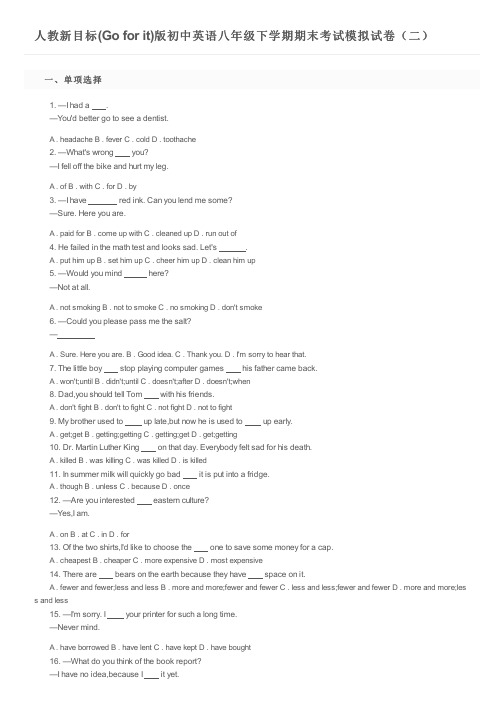
A . of B . with C . for D . by
3. —I have
red ink. Can you lend me some?
—Sure. Here you are.
A . paid for B . come up with C . cleaned up D . run out of
4. He failed in the math test and looks sad. Let's
.
A . put him up B . set him up C . cheer him up D . clean him up
5. —Would you mind
here?
—Not at all.
A . not smoking B . not to smoke C . no smoking D . don't smoke 6. —Could you please pass me the salt? —
A . on B . at C . in D . for 13. Of the two shirts,I'd like to choose the one to save some money for a cap. A . cheapest B . cheaper C . more expensive D . most expensive 14. There are bears on the earth because they have space on it. A . fewer and fewer;less and less B . more and more;fewer and fewer C . less and less;fewer and fewer D . more and more;les s and less 15. —I'm sorry. I your printer for such a long time. —Never mind.
go for it 人教版(新目标)英语 八年级 下册 单词 词汇表 带英标
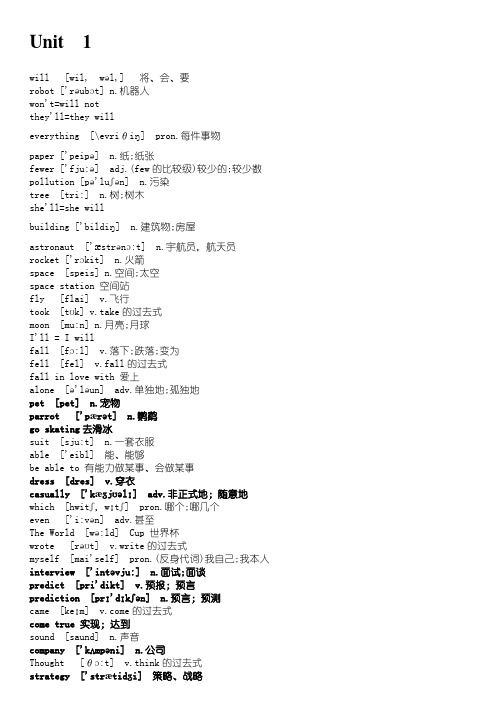
Unit 1will [wil, wəl,] 将、会、要robot ['rəubɔt] n.机器人won't=will notthey'll=they willeverything [\evriθiŋ] pron.每件事物paper ['peipə] n.纸;纸张fewer ['fju:ə] adj.(few的比较级)较少的;较少数pollution [pə'luʃən] n.污染tree [tri:] n.树;树木she'll=she willbuilding ['bildiŋ] n.建筑物;房屋astronaut ['æstrənɔ:t] n.宇航员,航天员rocket ['rɔkit] n.火箭space [speis] n.空间;太空space station 空间站fly [flai] v.飞行took [tʊk] v.take的过去式moon [mu:n] n.月亮;月球I'll = I willfall [fɔ:l] v.落下;跌落;变为fell [fel] v.fall的过去式fall in love with 爱上alone [ə'ləun] adv.单独地;孤独地pet [pet] n.宠物parrot ['pærət] n.鹦鹉go skating去滑冰suit [sju:t] n.一套衣服able ['eibl] 能、能够be able to 有能力做某事、会做某事dress [dres] v.穿衣casually ['kæʒjʊəlɪ] adv.非正式地;随意地which [hwitʃ,wɪtʃ] pron.哪个;哪几个even ['i:vən] adv.甚至The World [wə:ld] Cup 世界杯wrote [rəʊt] v.write的过去式myself [mai'self] pron.(反身代词)我自己;我本人interview ['intəvju:] n.面试;面谈predict [pri'dikt] v.预报;预言prediction [prɪ'dɪkʃən] n.预言;预测came [keɪm] e的过去式come true 实现;达到sound [saund] n.声音company ['kʌmpəni] n.公司Thought [θɔ:t] v.think的过去式strategy ['strætidʒi] 策略、战略fiction ['fikʃən] n.小说unpleasant [ʌn'plezənt] adj.使人不愉快的scientist ['saiəntist] n.科学家in the future ['fju:tʃə] 未来、将来hundred ['hʌndrəd] n.一百hundreds of 大量、许多have得(病)、患(病)already [ɔ:l'redi] adv.早已;先前made v.make的过去式factory ['fæktəri,fæktri] n.工厂simple ['simpl] adj.简单的;简易的such [sʌtʃ] adj.这样的;这种bored [bɔ:d] adj.厌烦的;厌倦的everywhere ['evrihwɛə] adv.各地;到处human ['hju:mən] n.人;人类huge [hju:dʒ] n.巨大的;极大的shape [ʃeip] n.外形;形状earthquake ['ə:θkweik] n.地震snake [sneik] n.蛇possible ['pɔsəbl] adj.可能的electric [I'lektrik] adj.电的;导电的toothbrush ['tu:θ'brʌʃ] n.牙刷seem v.像是;似乎impossible [im'pɔsəbl] adj.不可能的;不会发生的housework ['hauswə:k] n.家务;家务事rating ['reitiŋ] n.级别;等级UNIT2keep out 不让……进入play v.播放argue ['ɑ:ɡju:] v.争论;争吵wrong [rɔŋ] adj.错误的;有毛病的;不合适的What's wrong?怎么了?style [stail] n.风格、款式、式样out of style 不时髦的,过时的could [kud, kəd] modal v. can的过去式What’s the matter ['mætə] 怎么了call sb. up 打电话给ticket ['tikit] n.票;入场券surprise [sə'praiz] v.使惊奇;使意外on the phone 用电话交谈;在通话pay for 付……款、付买……的钱part-time job 兼职工作okay ['əu'kei] adj.好的either ['aiðə] adj.任一的;(两方中的)每一方的bake [beik] v.烤;烘Teen Talk [ti:n] 青少年论坛(节目名称)tutor ['tju:tə] n.家庭教师original [ə'ridʒinəl] adj.新颖的the same as 与……同样的in style [stail] 时髦的;流行的haircut ['heə'kʌt] n.理发;发型except [ik'sept] prep.除;把--除外upset [ʌp'set] adj.心烦的,沮丧的fail [feil] v.失败get on 相处;进展didn't = did notcouldn't = could notreturn [ri'tə:n] v.归还;送回football ['futbɔ:l] n.足球until [ən'til,ʌn'til] 到--为止fit …into…找到时间(做某事)as……as possible ['pɔsəbl] 尽可能……pressure ['preʃə] n.压力complain [kəm'plein] v.抱怨;埋怨、发牢骚include [in'klu:d] v.包括;包含pushy ['puʃi] adj.固执己见的;一意孤行的push [puʃ] v.推;推动;督促sent [sent] v.派遣、打发、安排去all kinds of 各种各样的compare [kəm'pɛə] v.比较crazy ['kreizi] adj.疯狂的;狂热的themselves [ðəm'selvz] (反身代词)他(她,它)们自己adult ['ædʌlt] n.成年人on the one hand (在)一方面organized ['ɔ:ɡənaizd] adj.有组织的on the other hand (在)另一方面freedom ['fri:dəm] n.自由UNIT 3UFO ['ju:ef'əʊ] 不行飞行物;飞碟barber ['bɑ:bə] (为男子服务的)理发师barber shop 理发店bathroom ['bɑ:θrum] 浴室bedroom ['bed'ru:m] 卧室;寝室kitchen ['kitʃin] 厨房get out 出去;离开alien ['eiljən] 从另一个世界来的生物;外星人bought [bɔ:t] buy的过去式land [lænd] 着陆got [gɔt] get的过去式take off 起飞while [hwail] 当……的时候experience [iks'piəriəns] 经历;体验imagine [I'mædʒin] 想象;设想strange [streindʒ] 奇怪的;陌生的follow ['fɔləu] 跟随;追随amazing [ə'meɪzɪŋ] 令人惊奇的kid [kid] 开玩笑;戏弄;欺骗scared [skeəd] 恐惧的climb [klaim] 攀登;爬jump [dʒʌmp] 跳跃shout [ʃaut] 呼喊;呼叫rode [rəʊd] ride的过去式train station ['steiʃən] 火车站ran [ræn] run的过去式run away 逃跑;跑掉anywhere [enihwɛə] 任何地方met [met] meet的过去式come in 进来happen ['hæpən] 发生accident ['æksidənt] 事故Beijing Internation Airport ['ɛəpɔ:t] 北京国际机场plane [plein] 飞机heard [həːd] hear的过去式modern ['mɔdən] 现代的;现代化的kill [kil] 杀死;致死Memphis [memfis] 孟菲斯(美国田纳西州西南部一城市)murder ['mə:də] v.and n.谋杀;凶杀hear about 听说bright [brait] adj.明亮的;发亮的playground ['pleiɡraund] n.运动场;操场bell [bel] n.钟;铃;门铃rang [ræŋ] v.ring的过去式told [təʊld] v.tell的过去式close [kləuz] v.关闭silence ['sailəns] n.寂静;沉静take place [pleis] 发生recent ['ri:snt] adj.最近的;近来的World Trade Center [wə:ld,treid, 'sentə] 世界贸易中心destroy [dis'trɔi] v.破坏;毁坏terrorist ['terərɪst] n.恐怖分子meaning ['mi:niŋ] n.意思;含义as……as 像……(一样)became [bɪ'keɪm] v.become的过去式flight [flait] n.航班,班机earth [ə:θ] n.地球hero ['hiərəu] n.英雄flew [flu:] v.fly的过去式UNIT 4mad [mæd] adj.很生气的;气愤的anymore ['enimɔː] adv.再也(不),(不)再direct speech [di'rekt,spi:tʃ] 直接引语reported speech [ri'pɔ:tid] 间接引语first of all 首先message ['mesidʒ] n.消息;信息pass on 传递supposed [sə'pəʊzd] v.假定;认为;期望be supposed to 被期望或被要求……hard-working adj.勤勉的,努力工作的do well in 在……方面做得好in good health 身体健康report card [riˈpɔ:t] 成绩单nervous ['nə:vəs] adj.神经紧张的;不安的envelope ['envələup] n.信封semester [si'mestə] n.学期true [tru:] adj.真实的disappointing ['dɪsə'pɔɪntɪŋ] 使人失望的;令人扫兴的lucky ['lʌki] adj.幸运的copy [kəup] v.复制;抄袭own [əun] adj.自己的get over 克服;恢复;原谅poor [puə] 贫穷的、贫困的American [ə'merɪkən] 美国的、美洲的village ['vilidʒ] n.乡村Peking University [pi:'kiŋ,'ju:ni'və:siti]北京大学graduate ['ɡrædjuit] n.大学毕业生volunteer ['vɔlən'tiə] n.志愿者The Ministry of Education 教育部Chinese Young Pioneer ['paiəˈniə] 中国少年先锋队rural ['ruərəl] adj.乡下的,乡村的area ['ɛəriə] n.地区;地域meter ['mi:tə] n.米;公尺sea level ['levl] 海平面thin adj.稀薄的ate v.eat的过去式fortunately ['fɔ:tʃənətli] adv.幸运地decision [di'siʒən] n.决定;决心husband ['hʌzbənd] n.丈夫dormitory ['dɔ:mitri] n.宿舍senior high school ['si:njə] 高中Open up 打开star n.开始;开端influence ['influəns] n.影响return [ri'tə:n] v.回来;返回hometown ['həʊm'taʊn] n.家乡;故乡Greenpeace ['ɡri:npi:s] “绿色和平”组织care for 照料;照顾UNICEF(United Nations International Children’s Emergency Fund) [I'mə:dʒənsi] 联合国儿童基金会WWF(World Wildlife Fund) ['waɪld'laɪf] 世界野生动物基金会danger ['deindʒə] n.危险UNIT 5have a great time 玩的愉快organize ['ɔ:ɡənaiz] v.组织take away 拿走clean-up 清除;打扫flower ['flauə] n.花agent ['eidʒənt] n.代理人;代理商around the world 在世界各地make a living 谋生against [ə'ɡenst, ə'ɡeinst] prep.反对、对…不利charity ['tʃæriti] n.慈善团体;慈善事业chance [tʃɑ:ns] n.机会;机遇all the time 一直injured [ɪndʒə] adj.受伤的;受损害的sincerely [sɪn'sɪəlɪ] adv.真诚地lawyer ['lɔ:jə] n.律师tonight [tə'nait] n.今晚;今夜mobile phone ['məubail] 移动电话REVIEW OF UNITS 1-5What’s the problem? ['prɔbləm] 怎么了?fat adj.胖的;肥的window ['windəu] n.窗户play football 踢足球consequence ['kɔnsikwəns] n.结果explain [iks'plein] v.解释;说明following ['fɔləuiŋ] adj.下列的;下述的UNIT 6collect [kə'lekt] v.收集;搜集shell [ʃel] n.贝壳;壳marathon ['mærə'θɔn] 体育比赛中)马拉松赛跑pair n.一对;一双skate [skeit] n.溜冰鞋since [sins] 自从;从……以来Hilltop School ['hɪl'tɔp] 一学校名称、可译为山顶学校raise [reiz] v.筹集several ['sevrəl] 几个的;数个的skater ['skeɪtə] n.溜冰者stamp [stæmp] n.邮票kite n.风筝monster ['mɔnstə] n.怪物,妖怪globe [ɡləub] n.球状体;球体anyone 任何人run out of 用完;用尽store [stɔ:] v.储存cake n.蛋糕;糕、饼类食品particularly [pə'tikjuləli] 特别;尤其;异乎寻常的collector [kə'lektə] n.收藏家by the way 顺便;附带说说common [ˈkɔmən] adj.共同的;公共的extra ['ekstrə] adj.额外的coin [kɔin] n.钱币;硬币topic ['tɔpik] n.话题;主题been v.be的过去分词be interested in 对……感兴趣writer ['raitə] n.作家,作者dynasty ['dainəsti] n.朝代;王朝character ['kæriktə] n.(著名的)人物;名人capital ['kæpitl] n.省会,首都European ['jʊərə'pi:ən] 欧洲的;欧洲人(的)Russian ['rʌʃən] adj.俄罗斯的;俄罗斯人(的)Australian [ɔ:'streɪljən] adj.澳大利亚的;澳大利亚人的 n.澳大利亚人Jewish ['dʒu:ɪʃ] adj.犹太人的;犹太族的Jew [dʒu:] n.犹太人thousand ['θaʊzənd] n.一千emperor ['empərə] n.皇帝foreigner ['fɔrinə] n.外国人quite [kwait] adv.相当;十分certain ['sə:tn] adj.确实的;无疑的the Olympic Games [əʊ'lɪmpɪk] 奥林匹克运动会far away 在远处miss v.思念;想念UNIT7not at all 一点也不turn down 把……调低;关小yard [jɑ:d] n.院子right away 立刻;马上task [tɑ:sk] n.任务;工作;作业poster ['pəustə] n.海报waitress ['weɪtrɪs] n.女服务生brought [brɔ:t] v.bring的过去式solution [sə'lu:ʃən] n.解答、解决办法line n.排;队;列wait in line 排队等候annoy [ə'nɔi] v.使恼怒,使生气annoyed [ə'nɔɪd] adj.恼怒的,生气的polite [pə'lait] adj.有礼貌的;客气的perhaps [pə'hæps] adv.或许;大概door n.门cut in line 插队hasn't = has notterm [tə:m] n.术语etiquette ['etɪ'ket] n.礼节normal ['nɔ:məl] adj.正常的;正规的behavior [bɪ'heɪvjə] n.行为;举止;表现at first 首先Asian ['eɪʒən, 'eɪʃən] adj.亚洲的;亚洲人的uncomfortable [ʌn'kʌmfətəbəl] adj.不舒服的impolite ['ɪmpə'laɪt] adj.无理的;粗鲁的allow [ə'lau] v.允许;准许keep …down 控制;抑制voice [vɔis] n.声音public ['pʌblik] n.公众take care 当心;小心cough [kɔf] v.咳嗽sneeze [sni:z] 打喷嚏break [breik] v.打破,违背break the rule 违反规则politely [pə'laɪtlɪ] adv.客气地;斯文地smoke [sməuk] v.抽烟;吸烟put out 扑灭、熄灭(火)、关灯cigarette ['siɡə'ret] n.香烟criticize ['kritisaiz] v.批判careful ['kɛəful] adj.当心;小心drop [drɔp] v.落下;掉下litter ['litə] n.垃圾pick [pik] v.采;摘;挑选pick …up 捡起behave [bi'heiv] v.举止;表现UNIT8comment ['kɔment] n.评论;意见album ['ælbəm] n.集子;唱片集;相片簿personal ['pə:sənəl] adj.私人的;个人的special ['speʃəl] adj.特别的;特殊的;专门的receive [ri'si:v] v.收到;接受gave [ɡeiv] v.give的过去式guy [ɡai] n.家伙;人spider ['spaidə] n.蜘蛛mouse [maus] n.(pl.mice)老鼠hamster ['hæmstə] n.仓鼠snake [sneik] n.蛇turtle ['tə:tl] n.海龟child [tʃaild] n.孩子;儿女pot-bellied [pɔt],'belid] 大腹便便的;大肚子的pig n.猪advantage [əd'vɑ:ntidʒ] n.有利条件;优点disadvantage ['disəd'vɑ:ntidʒ] n.不利条件;缺点popular ['pɔpjulə] adj.流行的perfect ['pə:fikt] adj.完美的,理想的rabbit ['ræbit] n.兔;野兔clean [kli:n] adj.清洁的;干净的company ['kʌmpəni] n.伙伴cost [kɔst] v.价值(若干);花(多少钱)asleep [ə'sli:p] adj.睡着的fall asleep 入睡choose [tʃu:z] v.选择present ['prezənt] n.礼物open v.打开gave [ɡeiv] v.give的过去式give away 赠送;分发bench [bentʃ] n.长凳;长椅rather than ['rɑ:ðə] 而不是Sweden ['swi:dn] 瑞典instead [in'sted] adv.代替;而不是the Olympics [əʊ'lɪmpɪks] 奥林匹克运动会enter ['entə,'entə(r)] v.参加;进入nearly ['niəli] adv.几乎sang [sæŋ] v.sing的过去式clearly ['klɪəlɪ] adv.清楚地;明显地stage [steidʒ] n.舞台native ['neitiv] adj.本地的;本国的native speaker 以某种语言为母语的人;说本族语的人winner ['wɪnə] n.胜利者modest ['mɔdist] adj.谦虚的,谦让的interested ['ɪntrɪstɪd] adj.感兴趣的encourage [in'kʌridʒ] v.鼓励spokesperson ['spəukspə:sn] n.发言人;代言人progress ['prəuɡres] n.进步;前进take an interested in 对……感兴趣hear of 听说make progress ['prəuɡres] 取得进步;取得进展besides 而且;除……之外make friends with 与……交友statement ['steitmənt] n.声明;陈述mention ['menʃən] v.提及;说起drive [draiv] v.开车;驾驶UNIT 9amusement ['ə'mju:zmənt] n.娱乐;消遣neither ['ni:ðə] pron.(二者)都不玩的愉快disneyland ['dɪznɪlænd] 迪斯尼乐园Mickey Mouse ['miki] 米老鼠Donald Duck ['dɔnəld] 唐老鸭character ['kæriktə] n.人物;角色seen v.see的过去分词theme [θi:m] n.主题attraction [ə'trækʃən] n.有吸引力的事物(人)roller coaster [ˈrəulə,'kəʊstə] 过山车cruise [kru:z] n.巡游;巡航board [bɔ:d] n.甲板on board 在船上route [ru:t] n.路线end up 结束island ['ailənd] n.岛;岛屿especially [is'peʃəli] adv.特别;尤其exchange student [iks'tʃeindʒ] n.交换生attendant [ə'tendənt] n.服务员flight attendant (飞机上的)空中服务员discover [dis'kʌvə] v.发现requirement [ri'kwaiəmənt] n.要求,必要条件guide [ɡaid] n.导游tour guide [tuə] 导游three quarters [ˈkwɔ:təs] n.四分之三foreign ['fɔrin] adj.外国的;外来的film n.电影southeast ['sauθ'i:st] n.东南 adj.东南的wonderful ['wʌndəful,'wʌndərfl] adj.极好的holiday ['hɔlədi] n.假日;假期节日quarter ['kwɔ:tə] n.四分之一;一刻钟population ['pɔpju'leiʃən] n.人口fear [fiə] v.害怕;担心brave [breiv] adj.勇敢的;无畏的excellent ['eksələnt] adj.卓越的;极好的Indian ['ɪndjən] adj.印度的;印度人的Night Safari [sə'fɑ:ri:] 夜间野生动物园dark [dɑ:k] n.黄昏;黑暗fox [fɔks] n.狐狸wake [weik] v.醒来;唤醒wake up 睡醒;醒来daytime ['deɪ'taɪm] n.白天;日间natural ['nætʃərəl,'nætʃrəl] 自然的;自然界的environment [in'vaiərənmənt] n.环境temperature ['tempəritʃə] n.温度all year round 一年到头,终年equator [I'kweitə] n.赤道whenever [hwen'evə] conj.无论如何spring [spriŋ] n.春天autumn ['ɔ:təm] n.秋天season ['si:zən,'siːzn] n.季节type ] [taip] n.类型awake [ə'ˈweik] adj.醒着的UNIT 10Franklin ['fræŋklin] 富兰克林湖noon n.中午sandy ['sændi:, 'sændi] adj.含沙的goodbye ['ɡʊd'baɪ] int.再见look through 浏览bookstore ['bʊk'stɔ:] n.书店cross [krɔs] v.穿过;横过;越过elevator ['eliveitə] n.电梯low [ləu] adj.低的slow [sləu] adj.慢的;缓慢的fan [fæn] n.迷;狂热迷note [nəut] n.短信;笔记come along [ə'lɔŋ] 出现;发生get along 相处baby n.婴儿;小孩at least [li:st] 至少traffic ['træfik] n.交通least [li:st] adj.little的最高级REVIEW OF UNITS 6-10review [ri'vju:] n.复习;回顾erhu 二胡(乐器名)Subtitle ['sʌb'taɪtl] n.(电影或电视上的)字幕web page 网页。
新目标八年级英语下册第二单元说课稿 Unit 2 I
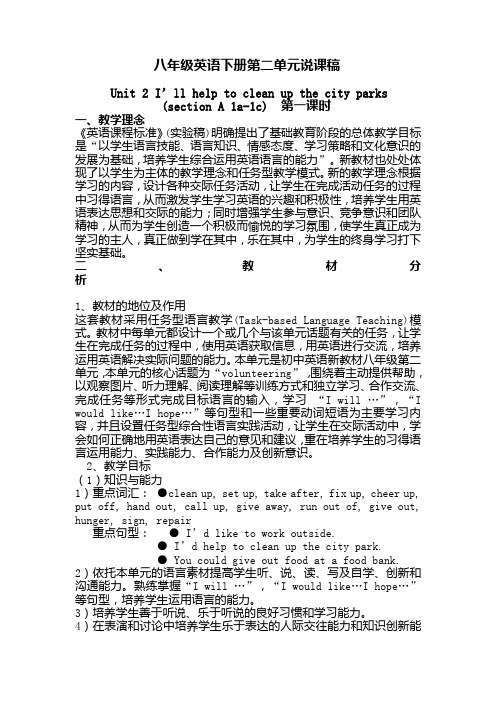
八年级英语下册第二单元说课稿Unit 2 I’ll help to clean up the city parks(section A 1a-1c) 第一课时一、教学理念《英语课程标准》(实验稿)明确提出了基础教育阶段的总体教学目标是“以学生语言技能、语言知识、情感态度、学习策略和文化意识的发展为基础,培养学生综合运用英语语言的能力”。
新教材也处处体现了以学生为主体的教学理念和任务型教学模式。
新的教学理念根据学习的内容,设计各种交际任务活动,让学生在完成活动任务的过程中习得语言,从而激发学生学习英语的兴趣和积极性,培养学生用英语表达思想和交际的能力;同时增强学生参与意识、竞争意识和团队精神,从而为学生创造一个积极而愉悦的学习氛围,使学生真正成为学习的主人,真正做到学在其中,乐在其中,为学生的终身学习打下坚实基础。
二、教材分析1、教材的地位及作用这套教材采用任务型语言教学(Task-based Language Teaching)模式。
教材中每单元都设计一个或几个与该单元话题有关的任务,让学生在完成任务的过程中,使用英语获取信息,用英语进行交流,培养运用英语解决实际问题的能力。
本单元是初中英语新教材八年级第二单元,本单元的核心话题为“volunteering”,围绕着主动提供帮助,以观察图片、听力理解、阅读理解等训练方式和独立学习、合作交流、完成任务等形式完成目标语言的输入,学习“I will …”,“I would like…I hope…”等句型和一些重要动词短语为主要学习内容,并且设置任务型综合性语言实践活动,让学生在交际活动中,学会如何正确地用英语表达自己的意见和建议,重在培养学生的习得语言运用能力、实践能力、合作能力及创新意识。
2、教学目标(1)知识与能力1)重点词汇:●clean up, set up, take after, fix up, cheer up, put off, hand out, call up, give away, run out of, give out, hunger, sign, repair重点句型:● I’d like to work outside.● I’d help to clean up the city park.● You could give out food at a food bank.2)依托本单元的语言素材提高学生听、说、读、写及自学、创新和沟通能力。
浅谈新课程实施中的初中英语新教材——以《新目标》(Go for it!)为例

准的要求 , 体现 学生身心特点 , 反映社会 、 政治 、 经济 、 科技
的发展需求 ; 教材内容应多样 、 生动……” 。在《 英语课程标
料。 部分单元有跨学科的语言活动 , 内容不同 , 且 形式多样。
但 日前 ,笔者对安徽省枞 阳县部分英语教师对英语新教材 适用性做 了一次调查 : 问及 “ 在 在英语新 教材 的教学 中, 您
在课 堂上感到 的困难是什 么” ,2 时 7 %的教师 回答是 “ 决 解
教材 内容多 而教 学时间紧之 间矛盾 ” 在问及“ ; 新教 材与 旧 教 材相 比哪一个难度 更大” ,4 时 8%的教师认为 “ 新教 材难
准》 实验稿 ) ( 在全国各 地实践后 , 初中英语新教材呈现 出多
元化 , 凸显 出可读性 、 可教性 , 给教学带来了新气象。
一
、
初 中英语新教材适用性的现状
索, 绝不是教学唯一 的凭借 。教师教学只是要“ 借助” 教材 ,
而非死守教材 。正如叶圣陶先生所说:教材无非是个例子 , “
二 、 课 程 实施 中的 教材 观 新
的处理 , 借教材 , 跳 出教 材——重组 、 既凭 又 优化 、 丰富敦
20 0 8年 第 8期 ( 第 8 总 0期 )
蒸 棼§ £{{ ’ 鬟 } 簸 t g e掺 l e 棼 rt 慧 s 堪尊譬; 0 l 謦 } 窖氇 s尊0 l 采} } 0 0强 l I
以《 目 fo 0i1 新 标》 rt为例, G f 1 它融汇话题、 交际功能和语
新目标版(Go for it)2019-2020学年初中英语八年级下册Unit 2 I'll help to clean up the city parks. 评
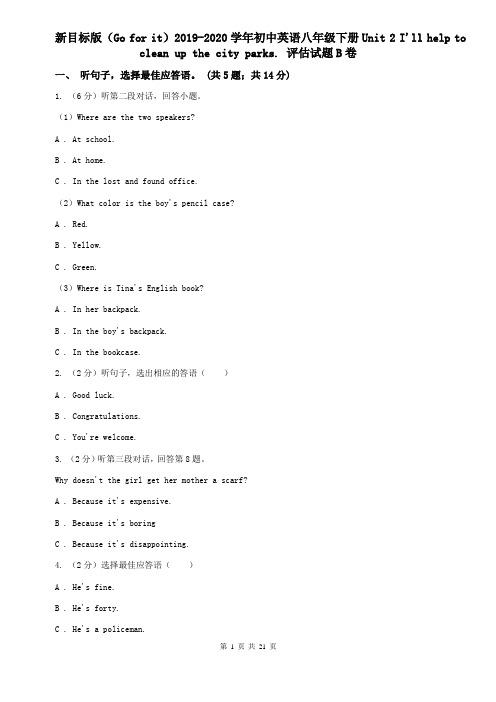
新目标版(Go for it)2019-2020学年初中英语八年级下册Unit 2 I'll help to clean up the city parks. 评估试题B卷一、听句子,选择最佳应答语。
(共5题;共14分)1. (6分)听第二段对话,回答小题。
(1)Where are the two speakers?A . At school.B . At home.C . In the lost and found office.(2)What color is the boy's pencil case?A . Red.B . Yellow.C . Green.(3)Where is Tina's English book?A . In her backpack.B . In the boy's backpack.C . In the bookcase.2. (2分)听句子,选出相应的答语()A . Good luck.B . Congratulations.C . You're welcome.3. (2分)听第三段对话,回答第8题。
Why doesn't the girl get her mother a scarf?A . Because it's expensive.B . Because it's boringC . Because it's disappointing.4. (2分)选择最佳应答语()A . He's fine.B . He's forty.C . He's a policeman.5. (2分)听句子,选出与所听内容相符的选项()A . aloneB . loneC . lonely二、听对话,选择最佳答案。
(共5题;共10分)6. (2分)When did the cartoon Kung Fu Panda 2 start last night?A . 9:40pm.B . 10:20pm.C . 10:40pm.7. (2分)What does Lily want to do now?A . To dance.B . To go to the movies.C . To listen to a CD8. (2分)据所听到的内容选择正确答语()A . She disagrees with her son.B . No, she doesn't.C . Yes, she does.9. (2分)What day is it today?A . Tuesday.B . Wednesday.C . Thursday.10. (2分)How old is the little panda?A . 12 months old.B . 10 months old.C . 8 months old.三、听长对话,选择最佳答案。
2014人教版新目标英语八年级下Unit_2__I’ll_help_to_clean_up_the_city_parks_sectionB 2a-2e

Paragraph 1 :
1.What is “Animal Helpers” ?
It is a group was set up to help disabled people. 2.What has lucky brought the writer?
Read after the tape and then circle “T” or “F”. 1. The writer can’t use her arms or legs well. T 2. Lucky was brought to the writer by her friend. F 3. They have been trained at “Animal helpers” for seven months. F 4. A dog-helper is for those who are disabled. T 5. Lucky can understand different orders.T
Read and learn the list of words below. Mark them in the article and decide the part of speech of each
word
group imagine training
disabled difficulties kindness
2c
Look at the list of words below. Circle the part of speech of each word and make your own sentences with these words.
1. group (adj. / n. ) We’d better go in a group. ___________________________________ 2. disabled (adj. / adv. ) I know a lot of disabled people need our help. __________________________________ 3. difference (adv. / n. ) Can you find the differences of the two ___________________________________ pictures? ________________________
人教版新目标初中英语Go_for_it! 七至九年级单词大全

1 1 1 1
1
1
1 1
1
1 1 1 1 1 1 1 1
七上预3 46 47 48 49 50 51 52 53 54 55 56 57 58 59 60 61 62 63 64 65 66 67 68 69 70 71 72 73 74 75 76 77 78 79 80 81 82 83 84 85 86 87 88 89 90 91 92 93 94 95 96 97 98 99 100 101 102 103 104 105 106 107 108 109 110 111 brown /braʊn/ adj. & n. 棕色(的);褐色(的) the /ði;ðə/ art. 指已提到或易领会到的人或事物 now /naʊ/ adv. 现在;目前 see /si:/ v. (saw /sɔ:/,seen /si:n/) 理解;明白 can /kæn;kən/ modal v. 能;会 say /seɪ/ v. (said /sed/,said) 说;讲 my /maɪ/ pron. 我的 name /neɪm/ n. 名字;名称 nice /naɪs/ adj. 令人愉快的;宜人的 to /tu:/ 常用于原形动词之前,表示该动词为不定式 meet /mi:t/ v. (met /met/,met) 遇见;相逢 too /tu:/ adv. 也;又;太 your /jɔ:(r)/ pron. 你的;你们的 Ms. /mɪz/(用于女子的姓氏或姓名前,不指明婚否)女士 his /hɪz/ pron. 他的 and /ænd/ conj. 和;又;而 her /hз:(r)/ pron. 她的 yes /jes/ interj. 是的;可以 she /ʃi:/ pron. 她 he /hi:/ pron. 他 no /nəʊ/ interj. 不;没有;不是 not /nɒt/ adv. 不;没有 zero /'zɪərəʊ/ num. 零 one /wʌn/ num. 一 two /tu:/ num. 二 three /θri:/ num. 三 four /fɔ:(r)/ num. 四 five /faɪv/ num. 五 six /sɪks/ num. 六 seven /'sevn/ num. 七 eight /eɪt/ num. 八 nine /naɪn/ num. 九 telephone /'telɪfəʊn/ n. 电话;电话机 number /'nʌmbə(r)/ n. 号码;数字 phone /fəʊn/ n. 电话;电话机 telephone (=phone number) 电话号码 first /fз:(r)st/ adj. 第一 first name 名字 last /lɑ:st/ adj. 最后的;末尾的 last name 姓 friend /frend/ n. 朋友 China /'tʃaɪnə/ 中国 middle /'mɪdl/ adj. 中间的 n.中间 school /sku:l/ n. 学校 middle school 中学;初中 sister /'sɪstə(r)/ n. 姐;妹 mother /'mʌðə(r)/ n. 母亲;妈妈 father /'fɑ:ðə(r)/ n. 父亲;爸爸 parent /'peərənt/ n. 父(母)亲 brother /'brʌðə(r)/ n. 兄;弟 grandmother /'ɡrænmʌðə(r)/ n.(外)祖母;奶奶;外婆;姥姥 grandfather /'ɡrænfɑ:ðə(r)/ n.(外)祖父;爷爷;外公;姥爷 grandparent /'ɡrænpeərənt/ n. 祖父(母);外祖父(母) family /'fæməli/ n. 家;家庭 those /ðəʊz/ pron. 那些 who /hu:/ pron. 谁;什么人 oh /əʊ/ interj. 哦;啊 these /ð i:z/ pron. 这些 they /ð eɪ/ pron. 他(她、它)们 well /wel/ interj. 嗯;好吧 have /hæv/ v. 经受;经历 day /deɪ/ n. 一天;一日;白天 Have a good day!(表示祝愿)过得愉快! bye /baɪ/ interj. (=goodbye) 再见 son /sʌn/ n. 儿子 cousin /'kʌzn/ n. 堂兄(弟、姊、妹);表兄(弟、姊、妹) 1 1
《新目标(Go for it!)》Self Check部分阅读教学的新尝试
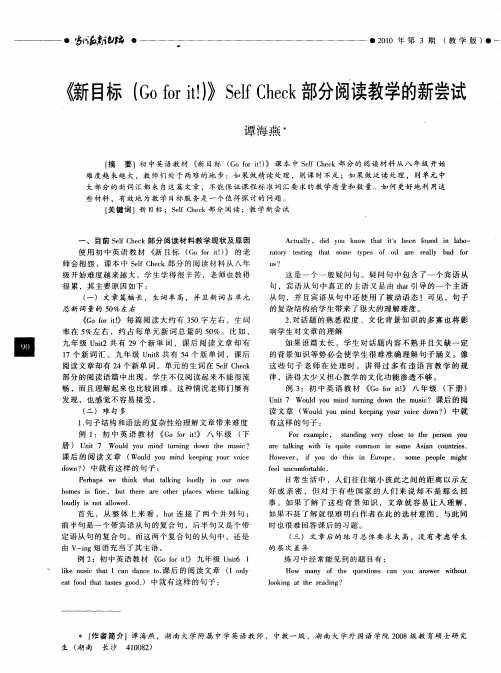
课 后 的 阅 读 文 章 ( ud y u m n epn or vie w0l o id k eig yu oc dw ? 中就 有 这样 的句子 : on)
P r a s e h n t a tl i g o dy n u o e h p w t i k h t a kn lu l i o r wn
例 3 初 中英 语 教 材 《 ofri》 八 年 级 ( 册 ) : G o t l 下
U i7 nt Wol o n u igdw h ui7 后 的阅 ud yu midtr n o n t m s .课 n e c
发 现 ,也 感 觉不 容 易接 受 。
( ) 难 句多 二
h me i n o s s f e, b t h r a e t e pa e wh r ak n i u t e e r o h r l c s ee tlig
fe n o ot b e e l u c mf r l . a
读 文 章 ( udyu mn epn orvi o n ) 中就 Wol o id ke i yu o e dw 9 g c .
有 这 样 的句 子 :
F r x mp e, sa dn v r co e o h p io y u o e a l tn i g ey ls t te e' n o s
《 0fr“》 每 篇 阅 读 大 约有 30字 左 右 ,生 词 G o ! 5 率在 5 %左 右 ,约 占每 单 元 新 词 总 量 的 5 %。 比 如 , 0
2 对 话 题 的熟 悉 程 度 、文 化 背 景 知 识 的 多 寡 也将 影 .
响学 生 对ቤተ መጻሕፍቲ ባይዱ 章 的理 解
■
新目标(Go for it)版2018-2019学年初中英语八年级下学期期末模拟复习卷三及参考答案
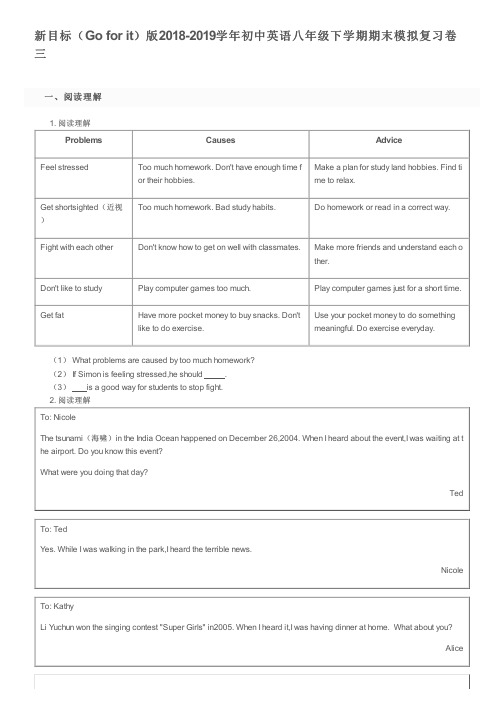
ESai Kung's Deserted Beaches *White beaches*Blue water*Beach volleyball*Open Mon. —Sun.FVictoria Park *Play bowls*Play tennis*Relax near the lake*Open Mon. —Sun.三、完形填空6. 完形填空My mother is a doctor.She is unable to get back home 1 every day.And she has to work on weekends sometimes.So it's ha rd for her to do all the 2 after work.As a member of the family,I think it's my duty to 3 some housework.4Mom always says she doesn't need any help,there are always things I can do.5 , I can help do the dishes and set the table.I'm sure Mom loves me 6 to help her.What's more,I'm trying to be 7.I wash my own clothes,tidy up my bedroom and take care 8 my things.I'm old enough to d o these things.And I can't9 on my parents forever.Always show your 10 to your mom for everything she does.I believe she will feel sweet.Try it now.四、语法填空7. 阅读下列短文,在每篇文章空白处填入一个适合的单词或填入括号中所给单词的正确形式。
人教版(新目标)初中英语八年级下册Unit 2 预习自学

Unit 2单词(音标)clean up 打扫( 或清楚) 干净cheer / t ʃɪə/ v. 欢呼; 喝彩cheer up ( 使) 变得更高兴; 振奋起来give out 分发; 散发volunteer /' vɒl ən' t ɪə/ v. 义务做; 自愿做n. 志愿者come up with 想出; 提出( 主意、计划、回答等)put off 推迟sign / sa ɪn/ n. 标志; 信号notice /' n əʊt ɪs/ n. 通知; 通告; 注意v. 注意到; 意识到hand out 分发call up 打电话给( 某人); 征召used to 曾经......; 过去......lonely /' l əʊnl ɪ/ adj. 孤独的; 寂寞的carefor 照顾; 非常喜欢several /' sevr əl/ pron. 几个; 数个; 一些strong / str ɒŋ/ adj. 强烈的; 强壮的feeling /' fi: l ɪŋ/ n. 感觉; 感触satisfaction /' sæt ɪs' fækʃən/ n. 满足; 满意joy / d ʒɒɪ/ n. 高兴; 愉快owner /' əʊnə/ n. 物主; 主人try out 参加...... 选拔; 试用journey /' dʒɜ: nɪ/ n. ( 尤指长途) 旅行; 行程raise /' reɪz/ v. 募集; 征集alone / ə' ləʊn/ adv. 独自; 单独repair / rɪ' peə/ v. 修理; 修补fix / fɪks/ v. 修理; 安装fix up 修理; 装饰give away 赠送; 捐赠take after ( 外貌或行为) 像broken /' brəʊkən/ adj. 破损的; 残缺的wheel / wi: l/ n. 车轮; 轮子letter /' letə/ n. 信 ; 函Miss / mɪs/ n. 女士; 小姐set up 建立; 设立disabled / dɪs' eɪbld/ adj. 丧失能力的; 有残疾的make a difference 影响; 有作用blind / blaɪnd/ adj. 瞎的; 失明的deaf / d ef/ adj. 聋的imagine / ɪ ' mædʒɪn/ v. 想象; 设想difficulty /' dɪfɪkəltɪ/ n. 困难; 难题open/' əʊpən/ v. 开; 打开door / dɔ:/ n. 门carry /' kær ɪ/ v. 拿 ; 提 ; 扛train / tre ɪn/ v. 训练; 培训excited adj. 激动的; 兴奋的training /' tre ɪn ɪŋ/ n. 训练; 培训kindness /' ka ɪndn ɪs/ n. 仁慈; 善良clever /' klevə/ adj. 聪明的; 聪颖的understand /' ʌnd ə' stænd/ v. ( understood) 理解; 领会change v. & n. 变化; 改变interest /' ɪntr ɪst/ n. 兴趣; 关注; v. 使感兴趣; 使关注sir / sɜ:/ n. 先生( 用于正式信函中对不知名的男性收信人的称呼时, 写为Sir) madam /' mæd əm/ n. 夫人; 女士( 用于正式信函中对不知名的女性收信人的称呼时, 写为Madam)Mario /' mereo/ 马里奥( 男名)Jimmy /' dʒɪm ɪ/ 吉米( 男名)unit2教材I’ll l11l 1 t€3 CILJT1 €tț1thc• c-ity p«rfis.LookstthewxysyoucoMdheppeopleîntReI hope to workourside.hclp to cleon up theWe girl could visit the sick kids in the hospital to cheer them up.the boy could give out food at the fond bank.The girl could volunteer in an after-school study program to teach kids. The boy could help to clcan up the city parks.4: \‘\é seed to come up with a plan For the City ParL plc an-Up D1y.B: Let‘s have lunch first.A: No, we need to start now. Cileari-Up Ray is cinly tive› weeks from now.A group of students are planning a City Park Clean-Up Day. Lieten and check (R) the thinge they are going to d« i» uu people abovst It.Listen again. Flll in the blanks.1. We need toa plan to tell [People abotit the city2. Clean-Up Day is only two weeks trom race'. We can’t making a plan.3. We couldsigns.4, Let’s make some notices, two. Then I'll them after school. 5. We could each 10 students and ask them tc› come.MaUksaconvereeWon u8ingcLe]nforrmationlnka:rndkb.Role-play the conversation.Helen: F 4i, Tom. I’m making some planx to svork in an old people’s home this»ummer.Tom: Really 1 did that last summer!Helen: Oh, what did they ask you to help cout with?Tom: Mm things like reading the newspa P er to the old people, or justtalking to them. They told me stories about the post and how things used to be.Helen: That sounds interesting.lom: Yeah, a lot of old people are lonely. ¥S'e should listen to them and c.are forem.Heten: Yo u’re right. 1 mean, we’re all going to be old one day, too.• •• • • • • • • • • I‘ll help to clean up the city parks. • • • • • • • • • • • - • • • • • • • • • • UNIT 2 • • • •• - • • • • •Read ttie axttcte. Wbat do Syria aod ñ€azy volunteer to dotStzzdezzts Who voJuzzteerMario C•reen and 2vlary Brown from Riverside High School give up severalhourn each week to help others.Mario lovcs animals and wants to be an animaldoctor. He volunteer.s at an anim al hospitai everySaturday morning. Mario believes it can help him -to get his future dream job. ”It‘s hard work,” he says,“ t› ut 1 want to learn more about how to care foran inn.Els. I get such a strong feeling of satisfactionwhcn I sec the animals get better and the look ofjoy on their c•wner›’races."Mary is a book lover. She could read by herself at the age of four. Estyear, she dccidcd to try out for a volunteer after•school reading program.Fhc rti)l 'nrks there nnre .1 weelt Eo helpkids leart› tc read. ‘The kiJ* are sitting inthe library, but you can see in their eyes thatthey're going on a different journey witheach new be ep yrpj untccring here is a dreamcome true for inc. I can d‹i what I love ter doand help others at the same tiiii«•,“,- xItead tbe azttctc agala and szzswer tbe qoesttoos.I.Why do Mario arid Mary volunteer to help others?2. What do they say a1›out volunlecr ingUae Izzi?zzitivca to complete the serstexzcee b elow.I . Mario wr›uld like an nnimal doctor.2.Mario works for an animal ht›spital because he wants about3.Mary decided for a job at an after-school reading program lastyear. She still works there now kids learn to read.4.Mary has a dream job because she can do w'hat she lovesUNIT 2I’d tikéto help h omeless people.She decided to tr/ ouE for a volunteerafiei-tool reading! Ypu covld ask hospitals to l et you visit Maiio believes it can help him to get his the kids and cheer them up, future dream job.She valunteers thete once a week to l›elp I'm making some signs to put up around kids learn to read. the school.PPM to tbe blazztca wttb tbe pfzraaaJ verhe in tJze hox.put.up 1.1 \vartt to my plan to work in an animal hospitaluntiJ next summer. I'm too busjr with my studies this year.hand our 2. She hopes to at )east five primary schools to ask if call up. they need volunteers for their after-school programs.cheer up 3. Our class is trjring to some ideas tocorrie up with sick children because they are often sad.Qivc o ut 4. We decided to signs around the school andput of? notices to tell students about the book sale. Wewill the rrtoney from the sale to homeless people. PIII la tlze h1anka wttk tke cozzect /orzoa oftise'‹rec be In tha boz.help move do make visit spendMost people today are only worried about getting B ood jo bs _ _ lots of money. In their fine time, they think about what _ for fun. However, few people think about what they can dn _ _ others. There are m any people who are less lucky than us. Volunteerin g our time to help these people ix a good w'ay _ _ our free tlme. For example, we can make planssick children in the hospital or raise money for homeless people. Some people even stop dning their jobs for a few months to a year to another place, like one of the countries in Afrinn, and help people there.I.1’d like to volunteer2.At 12:00 a.m., t called my friend3.I’m very busy but I could help4.Summer vacation is coming, and I want5.I want to travel alone. My parenii told me (not)• • • • • • • • • • I“II help to clean up the c t'/ parks. • • • • • • • • • • • • • • • • • • • • • • UNIT ZMatch the sentences with similar meanings.b 1. I‘ve run On1 Of it. a. I rep.aired it.2, I take akcr my mother. b. I clot›’t I›ax'e any fzsore uñit.3. I fixed it up. c. 1’m similar to her.* 4. 1 gave it away. d. 1 didn’t keep it.Match the plixasal verbs with the nouns. Then make sentences with theLlsten end number the pictures (1-4) In thc correct order.Lfstczs agato. Cfrñtc. 3- For zrue or 6 For £eI»e.1. Jimm)' fixes up broken bicycle parts, like wheels.T F2. Jimmy sells bikes.T F3. ]imm y tnLes after his mother.F4. Jimmy has run out of money."I’FRole-play a cozzversaUozz between /tmzoy and tbe reporter. Use the tnformatton in 1c and Id.ft: What do you do, Jimmy? B: I fix up ...How do you usually thank someone who helps you? Discuss thts with apartner.Skizn tbe Eetter and anawer tbe queeoons.1, R’ho wrote the letter to Miss Li? Why ? 2. ¥Vhat did Miss Li do?pDcar Miss Li,I‘d like to thank you for giving money to A nimalotnJ canHelpers. I‘m sure you know that this group svas set up to hel P disabled people like me. You helped to make it possihlc for me to have Lucky. Lucky makes a big difference to my life. let me tel) you my story.'\Ahat would it be like tu be bli‹1‹t or ileal? Or imagine you can’t walk or use your hands cmsil)'. Most people would never think abuut tliix, but many Jseople hns•e th Esc ‹difficulties. I can‘t use my arms or legs svell, so normal things like answering the telephone, opening ancl closing doocs, or carrying things are difficult for me. Then line d.ay last year, a friend of mine helped me out. i•he talkCd to Animal Helpers about gettin 8 me a special trained dens. Shc a)so thought a dog m ight cheer me up. I love animals and I was excited about the idea of having a dog. After six months ot twining with a dog at Animal Helpers, I was able to bring himhome. My dog‘s name is Lucky — a good name for him because 1 f eel very lucky to have him. YOu see, l‘iti only able to hn-e a ‘dog hdper” because of your kindness! Lucky is very clever and understands many English words, He can understand me u•hen I give him orders. For iixample, I say, ‘Lucky! Get my book,” and he does itat once.I. ucky ix a fantastic dog. I’ll send you a photo ofhim if you like, and I could shosv you how he helps rue. Thank you again for changing my life.'i .Best yr ixhes,Ben SmithBen Smith• • • •• I’ll help to clean up the city parks • • • - - • • • • • • • • • • • • • • • • • UNIT 2LooL at tke 1iaC o£worda betow. *Ctrl tbe pazt ofspeecb o:E each wozdand zoake yoor own scnteszces wit tbese worda.1. grtiup ( adj. / n. )2. disabled ( adj. f eñv. )1. difference ( adv. / n. )4. imagine ( v. / n. )S. difficulties ( n. / ad). )6. normal ( adv. / adj. )7. training ( adv. / a. )8. kindness ( n. / v. )L/ge tbe irzformattozt iat Use letter to zoake trzse sentcaccs by'zaatchtag e dtfEorertt azC8.SUBJECTAnimal HelpersVERBunable to move well.money to Animal Helpers. anirrials like Lucky,things for disabled people.LooR at these kinds of volunteer work. Can you add more? What wouldyou like to do* Dtacuaa it with a partner. • Worlting in an old people‘s home• Helping kids in an after-school program • Being a guide at a museum1. In what other ways do you think dogs are able to help people ?2. Vt'hat other animals can we train to help people ?Unit2 知识梳理【重点单词】clean up 打扫(清除)干净cheer [tʃiə] v. 欢呼cheer up 变得更高兴,振奋起来give out 分发,散发volunteer [ˌvɔlənˈtiə] n. & v. 志愿者;义务做come up with 想出,提出put off 推迟sign [saɪn] n. 标记,符号,标牌notice [ˈnəʊtɪs] n. & v. 通知,公告;注意到hand out 分发call up 打电话给…某人,征召usedto do sth. 过去常常做某事lonely ['ləʊnlɪ] adj. 孤独的,寂寞的care for 照顾,非常喜欢several [ˈsevrəl] prep. 几个,数个,一些strong [strɒŋ] adj. 强壮的,强烈的feeling [ˈfi:lɪŋ] n. 感觉,感触 satisfaction[ˌsætɪs'fækʃn] n. 满足,满意joy [dʒɔɪ] n.高兴,愉快owner [ˈəʊnə(r)] n. 所有者,物主tryout 参加…选拔,试用journey ['dʒɜ:nɪ] n. (尤指长途)旅行,行程raise [reɪz]v. 抬起,举起,筹集,征集alone [əˈləun] adv. 独自地,孤独地repair [riˈpɛə] v. 修理,修补fix[fiks] v. 修理,安装fix up 修理,修补giveaway 赠送,捐赠take after (外貌或行为)像broken ['brəʊkən] adj. 破损的,残缺的wheel [wi:l] n. & v. 轮子,车轮;旋转letter [ˈletə] n. 信件,字母Miss [mɪs] n. 小姐set up 建立,设立disabled [disˈeibəld] adj. 有残疾的,丧失能力的make a difference 影响,有作用blind [blaɪnd] adj. 盲的,盲目的,失明的deaf [def] adj. 聋的imagine [ɪˈmædʒɪn] v. 想象,设想difficulty ['dɪfɪkəltɪ] n. 困难open [ˈəʊpən] v. 打开door [dɔ:] n. 门carry ['kærɪ] v. 携带,搬运train [treɪn] v. 训练,培养training [ˈtreɪnɪŋ] n. 训练,培训excited[ɪkˈsaɪtɪd] adj. 激动的,兴奋的kindness [ˈkaɪndnəs] n. 仁慈,善良,亲切,善意clever [ˈklevə] adj. 聪明的,机灵的understand [ˌʌndəˈstænd] v. 懂,理解change [tʃeɪndʒ] n. & v. 改变interest ['ɪntrəst] n. & v. 感兴趣;兴趣sir[sɜ:(r)] n. 先生madam ['mædəm] n. 夫人,女士【重点短语】1.C lean-Up Day 清洁日2.an old people’s home 养老院3.help out with sth. 帮助解决困难ed to 过去常常......5.care for 关心;照顾6.the look of joy 快乐的表情7.at the age of 在...... 岁时8.c lean up 打扫(或清除)干净9.cheer up (使)变得更高兴;振奋10.give out 分发;散发e up with 想出;提出12.make a plan 制订计划13.make some notices 做些公告牌14.try out 试用;试行15.work for 为…工作;为…. 效力16.put up 建造;举起;张贴17.hand out 分发;散发;发给18.call up 打电话;召集19.put off 推迟;延迟20.for example 比如;例如Unit2 I'll help to clean up the city parks.01 词汇讲解1. clean upclean up意为“打扫”,up为副词,此短语是动副型短语,如果宾语为代词,应放在短语中间;如果宾语是名词,可放于短语之间或两词之后。
初中英语_Unit 2 I'll help to clean up the city parks.教学设计学情分析教材分析课后反思

Unit 2 I'll help to clean up the city parks.Section A 3a-3c教材版本:Go for it (八年级)Teacher:School:Date:Teaching aims知识目标:1.能够初步识记单词:several, strong, feeling, satisfaction,joy,owner等。
2.掌握动词不定式would like to do ,decide to do sth等用法。
能力目标:1.能熟练运用p11的词汇,掌握短语动词及动词不定式的用法。
2.通过交流学习,学会充分利用自己的特长,去帮助身边需要帮助的人。
情感目标:学会关注身边的生活环境,关注他人、社会,利用自己的特长为他人、社会做贡献,投身于社会公益活动,增强社会责任感。
学习策略:通过小组讨论的方式,达到理解课文并熟练掌握知识目标。
学会怎样用英语表达提供帮助,领会助人为乐是一种社会责任感的体现。
文化意识:让学生更多的了解志愿者的含义。
Key points and difficult pointsUse the language to communicate in the really situations. Teaching aids: CAI, pictures, & learning sheets.Teaching procedures: (T=teacher Ss=students)学情分析本单元针对八年级下学期学生,学生已有一定英语基础,对于to do不定式的用法学生以前接触过,同时帮助别人的话题与学生的生活紧密相连,又是学生饶有兴趣的内容,为表达提供了真实的材料,使学生在整个教学活动中想说、有话说,使活动参与的范围广,达到任务的真实性,有效性,更有利于引导他们自主学习。
并且八年级的学生学过一年半的英语,具备一定的英语听,说,读,写基础。
但部分后进生学习起来有压力,这就对教师的能力提出了很高的要求,教师在引导每一部分对话的时候,注意方法的引导。
2020年人教版新目标 英语 八年级下册 Unit 2 I’ll help to clean up
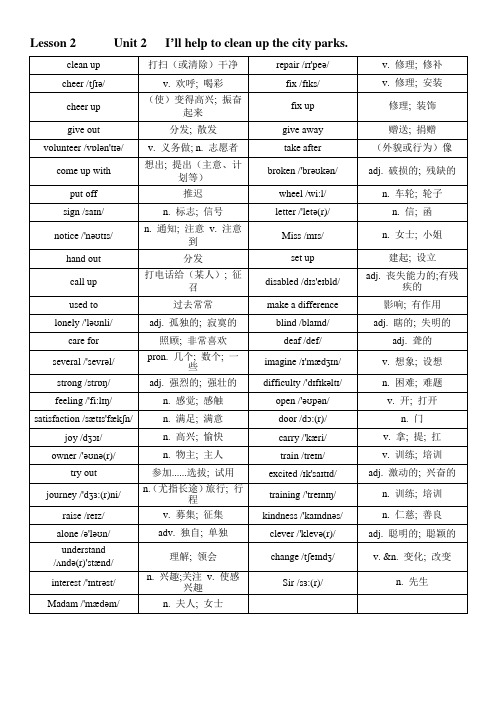
Lesson 2 Unit 2 I’ll help to clean up the city parks.一、重点单词1. 动词短语小结,常见的短语结构有以下几种:(1)动词+副词例如:give up, turn up, turn off, stay up这种结构相当于及物动词,如果宾语是代词,就必须放在动词和副词之间,如果是名词,可以放中间,也可以放短语后面。
(代中间、名两边)(2)动词+介词例如:listen to, look at, belong to,后跟宾语。
(3)动词+副词+介词例如:come up with, run out of2.Cheer(1)v. 欢呼、喝彩(2)c.n. 欢呼声(3)使某人高兴cheer sb. up (4)cheer on为...加油3.give out(1)散发,分发。
=hand out. (2)发出(光、热、声音、气味)(3)用完,耗尽。
Our food will give out soon.4.put off 推迟(后接n. pron. V.ing)put away收起来put on穿上put out扑灭,伸出put up张贴,举起,搭建put back放回原处put down放下、记下5.notice (1)c.n. 公告牌,通告,布告(2)u.n.注意take notice of what I say(3)v. 注意到,留心,看到ed to do过去常常...(现在不了),没有人称和时态的变化。
get/ be used to doing习惯于(一直在做),Be used to do被用作,be used for 被用于7.make a difference对...产生影响,difference前可以用big, great修饰。
It make no difference to me 这对我没影响8. fix up (1)意为修理;My watch is broken. Can you fix it up?(2)意为安排;(=arrange)Let’s fix a time for a meeting.fix v. 意为修理(=repair)过去式为fixed;现在分词为fixing单元短语积累:放弃give up 归还give back 建造、举起、张贴put up 做些公告牌make some notices打电话make a call 养老院old people’s home 帮助解决困难help out with sth.脱下、起飞take off单元句子积累:1.对我来说在这儿当志愿者是一个实现了的梦想。
新目标版英语八年级下册Unit2I'llhelptocleanupthecityparks.(SectionA)同步练习
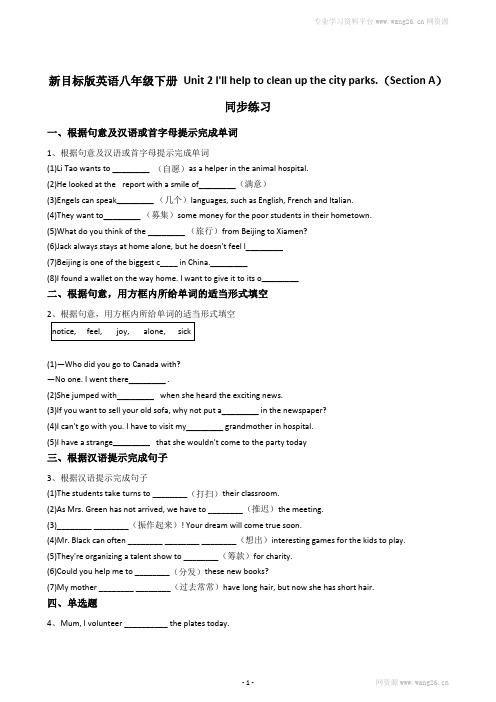
新目标版英语八年级下册Unit 2 I'll help to clean up the city parks.(Section A)同步练习一、根据句意及汉语或首字母提示完成单词1、根据句意及汉语或首字母提示完成单词(1)Li Tao wants to ________ (自愿)as a helper in the animal hospital.(2)He looked at the report with a smile of________(满意)(3)Engels can speak________(几个)languages, such as English, French and Italian.(4)They want to________(募集)some money for the poor students in their hometown.(5)What do you think of the ________(旅行)from Beijing to Xiamen?(6)Jack always stays at home alone, but he doesn't feel l________(7)Beijing is one of the biggest c____ in China.________(8)I found a wallet on the way home. I want to give it to its o________二、根据句意,用方框内所给单词的适当形式填空2、根据句意,用方框内所给单词的适当形式填空(1)—Who did you go to Canada with?—No one. I went there________.(2)She jumped with________when she heard the exciting news.(3)If you want to sell your old sofa, why not put a________in the newspaper?(4)I can't go with you. I have to visit my________grandmother in hospital.(5)I have a strange________that she wouldn't come to the party today三、根据汉语提示完成句子3、根据汉语提示完成句子(1)The students take turns to ________(打扫)their classroom.(2)As Mrs. Green has not arrived, we have to ________(推迟)the meeting.(3)________ ________(振作起来)! Your dream will come true soon.(4)Mr. Black can often ________ ________ ________(想出)interesting games for the kids to play.(5)They're organizing a talent show to ________(筹款)for charity.(6)Could you help me to ________(分发)these new books?(7)My mother ________ ________(过去常常)have long hair, but now she has short hair.四、单选题4、Mum, I volunteer __________ the plates today.A、washingB、washedC、to washD、be washed5、—Jeff seems unhappy. What's the matter?—He got his bike lost this afternoon. Let's go to __________ him __________.A、cheer, upB、make, upC、set; up6、His grandparents live __________ in a small house, but they don't feel __________.A、lonely; aloneB、alone; lonelyC、lonely; lonelyD、alone; alone7、I haven't decided when __________ a holiday yet.A、tookB、takingC、to takeD、take8、—How heavily it is raining!—What a pity! We have to __________ our sports meeting.A、put offB、put outC、put onD、put up9、—Peter has changed a lot, hasn't he?—Yes. He used to __________ the guitar, but now he is more __________ in playing soccer.A、plays; interestedB、play, interestedC、play; interestingD、playing; interest10、How kind you are! You always do what you can __________ others.A、helpB、helpingC、helpsD、to help11、______ age 7, Bruce won second prize in the piano competition.A、InB、AtC、OnD、For12、It was time for class. Mr. King asked all the children __________ down quietly.A、sitB、satC、to sitD、sitting13、Tom, your room is too dirty. You must __________.A、clean up itB、clean up themC、clean them upD、clean it up五、根据汉语完成句子14、根据汉语完成句子(1)我们可以召集十名同学过来帮我们。
- 1、下载文档前请自行甄别文档内容的完整性,平台不提供额外的编辑、内容补充、找答案等附加服务。
- 2、"仅部分预览"的文档,不可在线预览部分如存在完整性等问题,可反馈申请退款(可完整预览的文档不适用该条件!)。
- 3、如文档侵犯您的权益,请联系客服反馈,我们会尽快为您处理(人工客服工作时间:9:00-18:30)。
八年级英语(新目标)下册阅读与写作专题提升训练Unit 2 I'II help to clean up the city parks.Section A第一部分:基础知识第一节语法填空I.中考必考单词练练练。
(A)根据句意及汉语提示写出单词1. Goldilocks ___________(注意到)a little house, so she hurried towards it.2. Sometimes we feel ___________(孤独的)even though there are lots of people around.3. Jack has ___________(几个)good friends here, and he often visits them.4. My classmates are going to ___________(自愿)to visit sick children in the hospital this Sunday.5. I'm going to make a ___________(旅行)to Yunnan with my parents during the summer holidays.(B)用所给单词的适当形式填空6. Do you know the meanings of these ___________ (sign)?7. Everyone wants to get ___________ (satisfy) out of his or her job.8. Those famous singers had a concert ___________ (raise) money for Project Hope last Saturday.9. At last the policeman found out the ___________ (own) of the wallet.10. I have a ___________ (feel) of hunger. Do you have something to eat?II. 回顾课文,在空白处填入1个适当的单词或用括号内的单词的正确形式填空Mario Green and Mary Brown from Riverside High School give up several hours each week ___l___ (help) others.Mario loves animals and wants to be an animal doctor. He volunteers at an animal hospital every Saturday morning. Mario believes it can help him to get his future dream job. "It's hard work," he says,"but I want to learn more about how ___2___ (care) for animals. I get such a strong ___3___ (feel) of satisfaction when I see the animals get ___4___ (well) and the look of joy on their ___5___ (owner) faces.Mary is a book lover. She could read by ___6___ (she) at the age of four. Last year, she decided ___7___(try) out for a volunteer after-school reading program. She still works there ___8___ (one) a week to help kids learn to read. "The kids are sitting in the library, but you can see in their eyes that they're going on a different journey ___9___ each new book. ___10___ (volunteer) here is a dream come true for me. I can do what I love to do and help others at the same time.1. ____________2. ____________3. ____________4. ____________5. ____________6. ____________7. ____________8. ____________9. ____________ 10. ____________第二节课文重点句型回顾,每空一词1.我们要帮助打扫我们镇的街道。
We'll help to ____________ ____________ the streets in our town.2.我们确信中国梦会在不远的将来实现。
We are sure that the Chinese Dream will ____________ ____________ in the near future.3.因为天气不好,我们不得不推迟了运动会。
We had to ____________ ____________ the sports meeting because of the bad weather.4.他曾经住在伦敦。
He ____________ ____________ live in London.5.我们需要想一些新的主意使污水变干净。
We need to ____________ ____________ with some new ideas to make polluted water clean.6.为了使医院里的孩子们振作起来,这位年轻的志愿者常为他们唱歌。
This young volunteer often sings to the children in the hospital to ____________ them ____________.7.请原谅我这么早给你打电话。
Forgive me to ____________ you ____________ so early please.8.你为什么不去参加篮球队的选拔呢?Why don't you ____________ ____________ for basketball team?9.或许你可以同时做两件事情。
Perhaps you can do both ____________ ____________ ____________ ____________.10. 这位母亲日夜照料着生病的孩子。
The mother ____________ ____________ the sick child day and night.第二部分:阅读理解A读下面的文章,然后回答文章后的问题,请在1-5题后的横线上写上答案。
Mario Green and Mary Brown from Riverside High School give up several hours each week to help others.Mario loves animals and wants to be an animal doctor. He volunteers at an animal hospital every Saturday morning. Mario believes it can help him to get his future dream job. "It's hard work," he says, "but I want to learn more about how to care for animals. I get such a strong feeling of satisfaction when I see the animals get better and the look of joy on their owners' faces.Mary is a book lover. She could read by herself at the age of four. Last year, she decided to try out for a volunteer after-school reading program. She still works there once a week to help kids learn to read. "The kids are sitting in the library, but you can see in their eyes that they're going on a different journey with each new book. V olunteering here is a dream come true for me. I can do what I love to do and help others at the same time.1. What do Mario and Mary volunteer to do?________________________________________________________________________2. Why does Mario volunteer to help others?________________________________________________________________________3. How often does Mario volunteer at an animal hospital?________________________________________________________________________4. Why does Mary volunteer to help others?________________________________________________________________________5. What does Mary say about volunteering?________________________________________________________________________B读下面的文章,判断对错,正确的写T,错误的写F。
